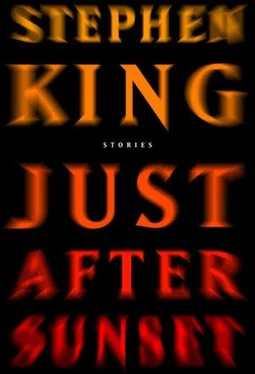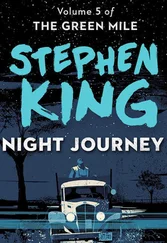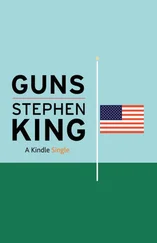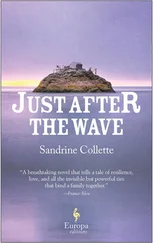Stephen King - Just After Sunset
Здесь есть возможность читать онлайн «Stephen King - Just After Sunset» весь текст электронной книги совершенно бесплатно (целиком полную версию без сокращений). В некоторых случаях можно слушать аудио, скачать через торрент в формате fb2 и присутствует краткое содержание. Город: New York, Год выпуска: 2009, ISBN: 2009, Издательство: SCRIBNER, Жанр: Ужасы и Мистика, на английском языке. Описание произведения, (предисловие) а так же отзывы посетителей доступны на портале библиотеки ЛибКат.
- Название:Just After Sunset
- Автор:
- Издательство:SCRIBNER
- Жанр:
- Год:2009
- Город:New York
- ISBN:978-1-4391-2548-9
- Рейтинг книги:5 / 5. Голосов: 1
-
Избранное:Добавить в избранное
- Отзывы:
-
Ваша оценка:
- 100
- 1
- 2
- 3
- 4
- 5
Just After Sunset: краткое содержание, описание и аннотация
Предлагаем к чтению аннотацию, описание, краткое содержание или предисловие (зависит от того, что написал сам автор книги «Just After Sunset»). Если вы не нашли необходимую информацию о книге — напишите в комментариях, мы постараемся отыскать её.
Just After Sunset — читать онлайн бесплатно полную книгу (весь текст) целиком
Ниже представлен текст книги, разбитый по страницам. Система сохранения места последней прочитанной страницы, позволяет с удобством читать онлайн бесплатно книгу «Just After Sunset», без необходимости каждый раз заново искать на чём Вы остановились. Поставьте закладку, и сможете в любой момент перейти на страницу, на которой закончили чтение.
Интервал:
Закладка:
All of this was in the picture, although none of it was in the picture. Sifkitz was not obsessed with it, it did not become his life, but he understood it was something new in his life, something good. He had no idea what he could do with such a thing once it was finished, and didn’t really care. For the time being he just liked getting up in the morning and looking at it with one eye open as he picked the cloth of his Big Dog boxers out of the crack of his ass. He supposed when it was done, he would have to name it. So far he had considered and rejected “Quittin’ Time,” “The Boys Call It a Day,” and “Berkowitz Calls It a Day.” Berkowitz being the boss, the foreman, the one with the Motorola cell phone, the guy in the LIPID cap. None of those names were quite right, and that was okay. He’d know the right name for the picture when it finally occurred to him. It would make a cling! sound in his head. In the meantime there was no hurry. He wasn’t even sure the picture was the point. While painting it, he had lost fifteen pounds. Maybe that was the point.
Or maybe it wasn’t.
II. Stationary Bike
Somewhere — maybe at the end of a Salada tea-bag string — he had read that, for the person who aspires to lose weight, the most effective exercise is pushing back from the table. Sifkitz had no doubt this was true, but as time passed he more and more came to believe that losing weight wasn’t his goal. Nor was getting buffed up his goal, although both of those things might be side-effects. He kept thinking of Dr. Brady’s metabolic working stiffs, ordinary joes who were really trying their best to do their job but getting no help from him. He could hardly not think of them when he was spending an hour or two every day painting them and their workaday world.
He fantasized quite a lot about them. There was Berkowitz, the foreman, who aspired to have his own construction company someday. Freddy, who owned the truck (a Dodge Ram) and fancied himself a fancy carpenter. Carlos, the one with the bad back. And Whelan, who was actually sort of a goldbrick. These were the guys whose job it was to keep him from having a heart attack or a stroke. They had to clean up the shit that kept bombing down from that queer red sky before it blocked the road into the woods.
A week after he began the painting (and about a week before he would finally decide it was done), Sifkitz went to The Fitness Boys on Twenty-ninth Street, and, after considering both a treadmill and a StairMaster (attractive but too expensive), bought a stationary bike. He paid an extra forty dollars to have it assembled and delivered.
“Use this every day for six months and your cholesterol number’s down thirty points,” said the salesman, a brawny young fellow in a Fitness Boys T-shirt. “I practically guarantee it.”
The basement of the building where Sifkitz lived was a rambling, multi-room affair, dark and shadowy, bellowing with furnace noise and crammed with tenants’ possessions in stalls marked with the various apartment numbers. There was an alcove at the far end, however, that was almost magically empty. As if it had been waiting for him all along. Sifkitz had the deliverymen set up his new exercise machine on the concrete floor facing a bare beige wall.
“You gonna bring down a TV?” one of them asked.
“I haven’t decided yet,” Sifkitz said, although he had.
He rode the stationary bike in front of one bare beige wall for fifteen minutes or so every day until the painting was finished, knowing that fifteen minutes was probably not enough (although certainly better than nothing) but also knowing it was about all he could stand for the time being. Not because he got tired; fifteen minutes wasn’t enough to tire him out. It was just boring in the basement. The whine of the wheels combined with the steady roar of the furnace quickly got on his nerves. He was all too aware of what he was doing, which was, basically, going nowhere in a basement under two bare lightbulbs that cast his double shadow on the wall in front of him. He also knew that things would improve once the picture upstairs was done and he could start on the one down here.
It was the same picture but he executed it much more quickly. He could do this because there was no need to put Berkowitz, Carlos, Freddy, and Whelan-the-goldbrick in this one. In this one they were gone for the day and he simply painted the country road on the beige wall, using forced perspective so that when he was mounted on the stationary bike, the track seemed to wind away from him and into that dark green and gray blur of forest. Riding the bike became less boring immediately, but after two or three sessions, he realized that he still wasn’t done because what he was doing was still only exercise. He needed to put in the red sky, for one thing, but that was easy, nothing but slop work. He wanted to add more detail to both shoulders of the road “up front,” and some litter, as well, but those things were also easy (and fun). The real problem had nothing to do with the picture at all. With either picture. The problem was that he had no goal, and that had always bugged him about exercise that existed for nothing more than its own sake. That kind of workout might tone you up and improve your health, but it was essentially meaningless while it was going on. Existential, even. That kind of workout was only about the next thing, for instance some pretty lady from some magazine’s art department coming up to you at a party and asking if you’d lost weight. That wasn’t even close to real motivation. He wasn’t vain enough (or horny enough) for such possibilities to keep him going over the long haul. He’d eventually get bored, and lapse into his old Krispy Kreme ways. No, he had to decide where the road was, and where it was going. Then he could pretend to ride there. The idea excited him. Maybe it was silly — loony, even — but to Sifkitz that excitement, though mild, felt like the real deal. And he didn’t have to tell anyone what he was up to, did he? Absolutely not. He could even get a Rand-McNally Road Atlas and mark his daily progress on one of the maps.
He was not an introspective man by nature, but on his walk back from Barnes & Noble with his new book of roadmaps under his arm, he found himself wondering exactly what had galvanized him so. A moderately high cholesterol number? He doubted it. Dr. Brady’s solemn proclamation that he would find this battle much harder to fight once he was post-forty? That might have had something to do with it, but probably not all that much. Was he just ready for a change? That felt like getting warmer.
Trudy had died of a particularly ravenous blood-cancer, and Sifkitz had been with her, in her hospital room, when she passed on. He remembered how deep her last breath had been, how her sad and wasted bosom had heaved upward as she drew it in. As if she had known this was it, this was the one for the ages. He remembered how she’d let it out, and the sound it had made — shaaaah! And how after that her chest had just stayed where it was. In a way he had lived the last four years in just that sort of breathless hiatus. Only now the wind was blowing again, filling his sails.
Yet there was something else, something even more to the point: the work-crew Brady had summoned up and Sifkitz himself had named. There was Berkowitz, Whelan, Carlos, and Freddy. Dr. Brady hadn’t cared about them; for Brady, the metabolic work-crew was just a metaphor. His job was to make Sifkitz care a little more about what was going on inside him, that was all, his metaphor not much different from the mommy who tells her toddler that “little men” are working to heal the skin on his scraped knee.
Sifkitz’s focus, though…
Not on myself at all, he thought, shaking out the key that opened the lobby door. Never was. I cared about those guys, stuck doing a never-ending clean-up job. And the road. Why should they work so hard to keep it clear? Where did it go?
Читать дальшеИнтервал:
Закладка:
Похожие книги на «Just After Sunset»
Представляем Вашему вниманию похожие книги на «Just After Sunset» списком для выбора. Мы отобрали схожую по названию и смыслу литературу в надежде предоставить читателям больше вариантов отыскать новые, интересные, ещё непрочитанные произведения.
Обсуждение, отзывы о книге «Just After Sunset» и просто собственные мнения читателей. Оставьте ваши комментарии, напишите, что Вы думаете о произведении, его смысле или главных героях. Укажите что конкретно понравилось, а что нет, и почему Вы так считаете.












